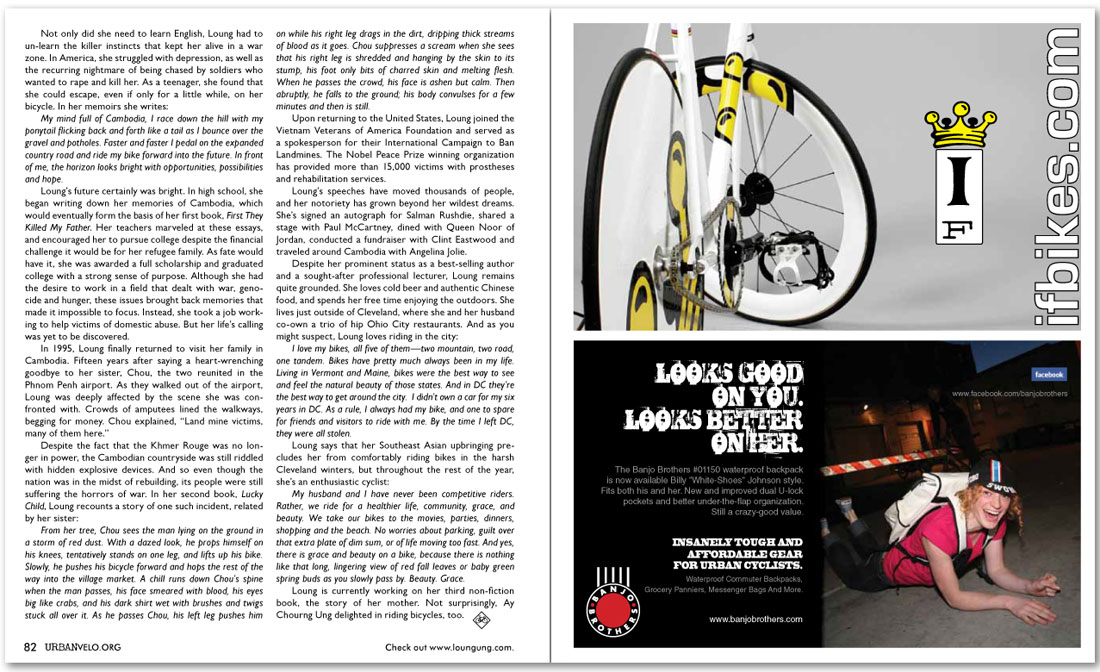


Not only did she need to learn English, Loung had to un-learn the killer instincts that kept her alive in a war zone. In America, she struggled with depression, as well as the recurring nightmare of being chased by soldiers who wanted to rape and kill her. As a teenager, she found that she could escape, even if only for a little while, on her bicycle. In her memoirs she writes:
My mind full of Cambodia, I race down the hill with my ponytail flicking back and forth like a tail as I bounce over the gravel and potholes. Faster and faster I pedal on the expanded country road and ride my bike forward into the future. In front of me, the horizon looks bright with opportunities, possibilities and hope.
Loung’s future certainly was bright. In high school, she began writing down her memories of Cambodia, which would eventually form the basis of her first book, First They Killed My Father. Her teachers marveled at these essays, and encouraged her to pursue college despite the financial challenge it would be for her refugee family. As fate would have it, she was awarded a full scholarship and graduated college with a strong sense of purpose. Although she had the desire to work in a field that dealt with war, genocide and hunger, these issues brought back memories that made it impossible to focus. Instead, she took a job working to help victims of domestic abuse. But her life’s calling was yet to be discovered.
In 1995, Loung finally returned to visit her family in Cambodia. Fifteen years after saying a heart-wrenching goodbye to her sister, Chou, the two reunited in the Phnom Penh airport. As they walked out of the airport, Loung was deeply affected by the scene she was confronted with. Crowds of amputees lined the walkways, begging for money. Chou explained, “Land mine victims, many of them here.”
Despite the fact that the Khmer Rouge was no longer in power, the Cambodian countryside was still riddled with hidden explosive devices. And so even though the nation was in the midst of rebuilding, its people were still suffering the horrors of war. In her second book, Lucky Child, Loung recounts a story of one such incident, related by her sister:
From her tree, Chou sees the man lying on the ground in a storm of red dust. With a dazed look, he props himself on his knees, tentatively stands on one leg, and lifts up his bike. Slowly, he pushes his bicycle forward and hops the rest of the way into the village market. A chill runs down Chou’s spine when the man passes, his face smeared with blood, his eyes big like crabs, and his dark shirt wet with brushes and twigs stuck all over it. As he passes Chou, his left leg pushes him on while his right leg drags in the dirt, dripping thick streams of blood as it goes. Chou suppresses a scream when she sees that his right leg is shredded and hanging by the skin to its stump, his foot only bits of charred skin and melting flesh. When he passes the crowd, his face is ashen but calm. Then abruptly, he falls to the ground; his body convulses for a few minutes and then is still.
Upon returning to the United States, Loung joined the Vietnam Veterans of America Foundation and served as a spokesperson for their International Campaign to Ban Landmines. The Nobel Peace Prize winning organization has provided more than 15,000 victims with prostheses and rehabilitation services.
Loung’s speeches have moved thousands of people, and her notoriety has grown beyond her wildest dreams. She’s signed an autograph for Salman Rushdie, shared a stage with Paul McCartney, dined with Queen Noor of Jordan, conducted a fundraiser with Clint Eastwood and traveled around Cambodia with Angelina Jolie.
Despite her prominent status as a best-selling author and a sought-after professional lecturer, Loung remains quite grounded. She loves cold beer and authentic Chinese food, and spends her free time enjoying the outdoors. She lives just outside of Cleveland, where she and her husband co-own a trio of hip Ohio City restaurants. And as you might suspect, Loung loves riding in the city:
I love my bikes, all five of them—two mountain, two road, one tandem. Bikes have pretty much always been in my life. Living in Vermont and Maine, bikes were the best way to see and feel the natural beauty of those states. And in DC they’re the best way to get around the city. I didn’t own a car for my six years in DC. As a rule, I always had my bike, and one to spare for friends and visitors to ride with me. By the time I left DC, they were all stolen.
Loung says that her Southeast Asian upbringing precludes her from comfortably riding bikes in the harsh Cleveland winters, but throughout the rest of the year, she’s an enthusiastic cyclist:
My husband and I have never been competitive riders. Rather, we ride for a healthier life, community, grace, and beauty. We take our bikes to the movies, parties, dinners, shopping and the beach. No worries about parking, guilt over that extra plate of dim sum, or of life moving too fast. And yes, there is grace and beauty on a bike, because there is nothing like that long, lingering view of red fall leaves or baby green spring buds as you slowly pass by. Beauty. Grace.
Loung is currently working on her third non-fiction book, the story of her mother. Not surprisingly, Ay Chourng Ung delighted in riding bicycles, too.
Check out www.loungung.com.